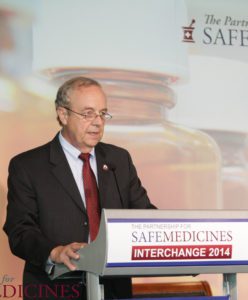HHS's Federal Action Plan for Drug Importation

On May 24, 2022, PSM held an online congressional briefing with a panel of experts to let legislators know why drug importation is a dangerous proposition. Watch briefing highlights or the entire event.
Current status:
The regulations took effect on November 30, 2020. PSM, PhRMA, and CAHC have filed suit in federal court to block them from taking effect.
On May 28, 2021 the Department of Health and Human Services filed a motion to dismiss the suit on the grounds that PSM, PhRMA, and CAHC did not have grounds to sue until the government had approved a state importation program.
PSM, PhRMA, and CAHC filed an amended complaint on July 2, 2021.
In the meantime, Colorado and Florida have submitted applications to begin state importation programs.
The State of Florida and Florida's Agency for Health Care Administration filed suit against the FDA and Department of Health and Human Services for delaying approval of its state importation program in August 2022.
Synopsis:
On September 24, 2020, the federal government released a Final Rule on Canadian drug importation (pathway 1), as well as Industry Guidance for manufacturer reimportation (pathway 2), and requests for proposals for waivers for individual prescription drug importation (pathway 3) and insulin reimportation programs (pathway 4) with an accompanying FAQ for the latter.
PSM, PhRMA, and CAHC have all filed suit against these regulations. You can read our joint announcement, our explainer about why we filed the litigation, and the complaint itself [PDF].
How should we evaluate this program?
Until July 2019, every head of Health and Human Services and the FDA since 2003 has refused to certify the safety of drug importation. Many—including Alex Azar, former FDA Commissioner and Trump appointee Scott Gottlieb, and his four immediate predecessors—have explicitly criticized these proposals as unsafe, unimplementable, and unlikely to save money.
HHS and FDA haven't implemented their proposals yet so there's no way to evaluate whether they save money or keep patients safe. However previous programs in Maine, Illinois, and Minnesota all shut down because they didn't save the money promised. They all had safety lapses as well.
Official Actions Since the Rule was Approved
June 1, 2021: Florida files an amicus brief in support of HHS's importation rule.
May 28, 2021: HHS files a motion to dismiss the suit.
November 23, 2020: PSM, Pharmaceutical Research and Manufacturers of American and The Council for Affordable Healthcare file a complaint alleging that the Final Rule disregards key protections of the Federal Food, Drug, and Cosmetic Act
Timeline of the approval of final rule for Canadian drug importation
September 24, 2020 - HHS published final rule for Canadian drug importation, as well as RFPs for personal importation waivers and and reimportation of insulin, and guidance for manufacturers who may choose to reimport their own drugs. (Links to those documents below, in Planning Documents.)
December 23, 2019 - March 9, 2020: HHS solicits comments about RIN 0919-AI45
July 31, 2019:
- HHS Announces New Action Plan to Lay Foundation for Safe Importation of Certain Prescription Drugs
- Remarks on the Safe Importation of Certain Prescription Drugs
August 6, 2019:
August 20, 2019:
- Florida submits a Canadian Prescription Drug Importation Concept Paper to HHS
Fall 2019:
- Office of Information and Regulatory Affairs posts RIN 0910-AI45, a draft of the proposed rule for the importation of prescription drugs.
Planning documents
Pathway 1, Wholesale Canadian Drug Importation: Final rule (PDF, 179 pages) and Redline (shows differences from December's draft rulemaking).
Pathway 2, Manufacturer Reimportation: Guidance for Industry
Pathway 3, Individual Waivers for Personal Importation: Request for Proposals
Pathway 4, Reimportation of Insulin: Request for Proposals and FAQ
Letter from HHS Secretary Alex Azar to House Minority Leader Kevin McCarthy certifying the final rule on wholesale Canadian drug importation, September 23, 2020.
HHS/FDA announces the Safe Importation Action Plan. July 31, 2019
Section 804 of the Food, Drug and Cosmetic Act which outlines the method by which the Federal government may import medicine from Canada.
Background / resources
Just learning about foreign drug importation proposals? Start with some of these resources that outline the safety issues.
PSM Materials:
- Learn about failures to save money and keep patients safe in previous importations programs in Maine, Illinois, and Minnesota.
- Every head of Health and Human Services and the FDA since 2003 has refused to certify the safety of drug importation
- Importation has been opposed by dozens of groups representing law enforcement, patients, regulators, and healthcare professionals for nearly two decades.
- Drug importation endangers U.S. patients by breaking our closed, secure drug supply
- Common misconceptions about drug importation
Challenges to importation:
- Canadian patient groups, healthcare groups, boards of pharmacy and the Canadian government have not agreed to importation.
- A 2018 study by PSM board member and pharmaco-economist Dr. Marv Shepherd shows that if 20% of U.S. prescriptions were filled using Canadian prescription drug sources, the Canadian drug supply would be exhausted in 183 days.
- Dr. Kristina Acri's analysis shows that importation programs are unlikely to save money because of the costs of testing medication and treating patients who encounter counterfeits.
- Importation breaks Track and Trace systems which have been in-process since 2013, when Congress passed the Drug Supply Chain Security Act.
- State Drug Importation Laws Undermine the Process That Keeps Our Supply Chain Safe (July 11, 2019)
- In February 2017, Alan Coukell, the senior director of health programs for the Pew Charitable Trusts wrote Senator Bernie Sanders, to raise concerns about the effect of importation on the pharmaceutical supply chain security provisions.
- To learn more about Track and Trace, consult the FDA and RXTrace
Coverage:
- Everything (or almost everything) you need to know about importing drugs from Canada, July 31, 2019
- Canada wasn’t consulted on specifics of U.S. plan to import prescription drugs, July 31, 2019
- U.S. demand is threatening Canada's drug supply, groups warn feds, July 26, 2019
- Exclusive: Canada warns U.S. against drug import plans, citing shortage concerns, July 18, 2019
- HHS Secretary Alex Azar dismisses drug importation as a gimmick, May 14, 2018
Op-eds from the Experts
In this August 9, 2018 editorial for RealClearMarkets, Bill Martinez reminds Americans that the FDA hasn’t yet approved importation for a reason: it’s impossible to open the floodgates to foreign drug imports without cutting corners on safety.
While the Trump administration works to stem the raging epidemic of opioid addiction, Sen. Bernie Sanders, I-Vt., has a plan to make it worse. He calls it the Affordable and Safe Prescription Drug Importation Act, S. 469. This legislation would open our borders to the free flow of drugs – all drugs – from Canada and other countries.
It would be more accurate to call it the Unsafe Opioid Importation Facilitation Act – and we can’t afford it. Sanders is still peddling the bogus line that importing prescription drugs from Canada is the ticket to lower health-care bills for Americans. Not only has Bernie’s tonic been exposed as a fraud, it is downright deadly. Read more…
In a June 7, 2018 editorial for The Hill, Former FBI deputy assistant director and Pharmaceutical Security Institute President Thomas Kubic argues that current sentences and penalties are not strong enough to deter criminal drug importation: “It boils down to this, if an entity — be it an organization or person — opts to engage in activities involving illegal distribution chains, there should be consequences, often certain, swift, and overwhelmingly punitive.”
By approving the wholesale reimportation of U.S. prescription drugs from Canada, the Vermont Legislature passed an illegal measure that will not lower drug prices. Instead, it will subject Vermonters to public health risks and new taxes to defray an inevitable federal lawsuit.
A nonprofit executive wrote in this April 20, 2018 editorial that America needs to concentrate on keeping counterfeit drugs, including those made with fentanyl, from crossing our northern border just as much as the southern…
In a February 16, 2018 editorial for the Salt Lake Tribune, BioUtah President and CEO Kelly Slone explained that importing medicines from Canada would “open the door to dangerous counterfeit medicines,” and “dampen job growth in Utah’s vibrant, dynamic life-sciences industry.”
In this editorial, which was published in the Deseret News on February 11, 2018, economics professor Dr. Kristina Acri warns that drug importation will expose Utahns to dangerous counterfeit drugs.
“After more than two decades of studying the economic and health impacts of drug importation,” she writes. “the verdict on bringing drugs in from Canada is clear and consistent: It’s a risky gamble and one too dangerous to take. Experts know that preventing the introduction of dangerous counterfeit medicines cannot be guaranteed.”
This editorial by Dr. Yanira Cruz was published in Morning Consult on January 18, 2018. Cruz, who is the president and CEO of the National Hispanic Council on Aging and holds a doctorate in Public Health, writes that,
“For Hispanics, the notion of opening up our borders for imported drugs presents a particularly acute threat. Latino families are already afflicted with a ‘perfect storm’ of comparatively poor health and limited access to health care resources. Adding an increased threat of counterfeit – and potentially dangerous – drugs to that mix would be nothing short of devastating.”
Liz MacMenamin’s editorial was published in the Reno Gazette Journal on November 1, 2017. MacMenamin is is vice president of government affairs for the Retail Association of Nevada…
Oklahoma Pharmacists Association Director Debra Billingsley published an editorial on October 21, 2017 opposing drug importation proposals:
Now is not the time to allow foreign unlicensed pharmacies to start dispensing drugs into Oklahoma. It would just make it easier for drug traffickers or crooked providers to hurt our citizens.








